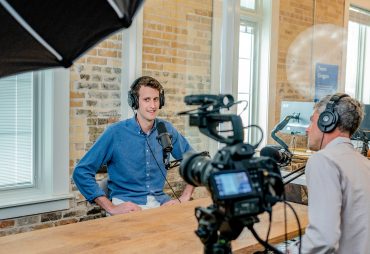 If you want to get more media coverage for your business or company it’s essential you’re seen and heard in the media on a regular basis.
If you want to get more media coverage for your business or company it’s essential you’re seen and heard in the media on a regular basis.
Journalists are constantly looking for interesting and engaging stories they can develop for their viewers and listeners. When you make yourself available for commentary in the media, you are positioning yourself and your business in a powerful way so people take notice of what you have to say.
Media training can be highly effective in helping you develop the skills to get your message across succinctly and with impact. And when you are an effective spokesperson, the media will return to you again and again for expert commentary on your area of expertise.
Here are our five compelling reasons to consider media training:
1. You can learn how to speak in a way that people take notice
Media training can teach you how to use your words, tone, and body language to deliver your message in a powerful way. When you are speaking on television, people are not only listening to your word; they are also looking at your body language and facial expressions.
One of the biggest benefits of media training is you can develop your confidence in speaking with the media. Many people are terrified by interviews, and in particular, live radio or television. However, when you develop your interview skills you will find speaking in the media is one of the most powerful forms of marketing and PR for your business.
2. You can clearly and concisely define your key messages
Defining your key messages is essential so you know exactly what you want to convey when you are being interviewed by the media. Your key messages should be original, short, focused on your audience, focused on the benefits of your product or service and use the language that suits your audience.
Don’t have more than five key messages or you will dilute the impact of what you are saying. When you are clear on your key messages, you can then keep coming back to them throughout the interview to get your points across.
3. You can develop prepared responses to difficult questions
Sometimes journalists can ask you questions that are difficult to answer or put you on the spot. Media training can prepare you for challenging questions so you’re prepared for any unexpected twists or turns in the interview. Through preparing yourself for difficult questions you can feel more confident as you step into the interview.
4. You can learn to control the media interview
Even though you will be asked questions by the journalist you are in control of the interview. Media training can teach you how to maintain your composure throughout the interview and create the outcome you want.
When you are clear about your responses you can steer the interview in the direction you want. This is a subtle and important skill that can be learned through media training and practice.
5. You’re less likely to get misquoted
If you go into the interview without having clarity around your key messages or feeling under-prepared for difficult questions, the likelihood of being misquoted or saying the wrong thing will be much higher. Media training can help you avoid the possibility of being misquoted through learning the specific skills of clear, concise and effective communication.
Want more PR tips? Download this free ebook
Sydney Public Relations Agency, CP Communications provides specialist media, traditional and online PR strategies that get amazing results. Contact us today. For more great tips visit our website www.cpcommunications.com.au.




